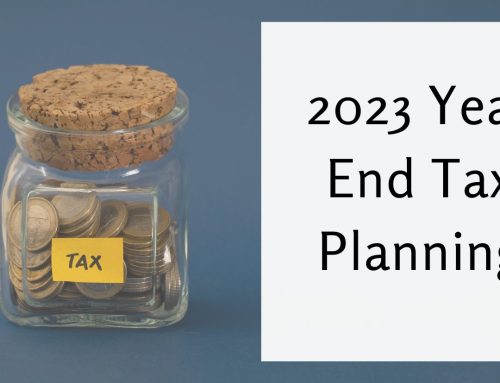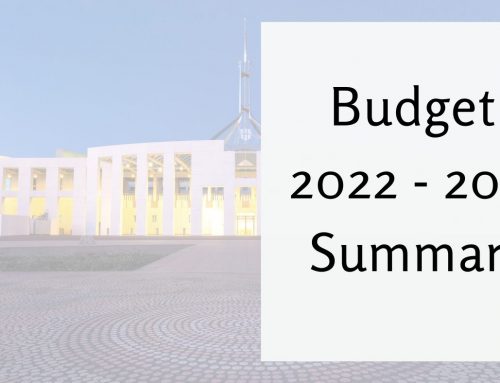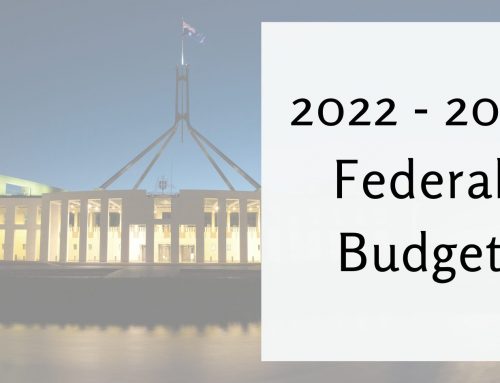After the October Budget non-event we were looking forward to a more pro-active and interesting May 2023 Federal Budget.
Just as is the case with many movie sequels, the May 2023 Budget was disappointing.
The Government obviously wanted to test reaction to various measures by leaking the measures in advance to gauge what the community reaction would be. Despite the Treasurer talking down the economy at every opportunity since taking the reins, the Budget should be in surplus this time next year. This should not come as a shock given that we essentially have full employment (i.e. the number of available jobs compared to the number of unemployed is now 1:1), commodity prices for the best part of the 2022 financial year were at record highs and the tax payable on these profits has now been paid.
In our Budget Summary over the past 20 odd years we have focused on the changes that will impact clients from a taxation perspective. This year is no different. However, our Budget Summary is brief because there was not a lot for small business or individuals in the Budget. The main points that we have taken from the Budget are as follows:
Superannuation Changes
1.1
A few years ago the “non-arms length” income and expense provisions (NALI and NALE) within the Income Tax Assessment Act were tightened and made more complicated. While the deferment of the application of these measures was welcomed the measures remain abstract and difficult for many to have a clear understanding of what is permissible and what is not permissible. In our view the recent amendments should simply be abolished and we go back to a system that was much simpler and easier for everyone to understand. As this will not happen the Budget provided the framework for further changes to the NALI/NALE provisions and these are:
- Limiting income of SMSFs and Small APRA Funds that are taxable as NALI to twice the level of a general expense. Fund income taxable as NALI will exclude contributions.
- Large APRA Funds (i.e. industry funds) will be exempt from the NALI provisions for both general and specific expenses of the Fund
- Expenditure that occurred prior to the 2019 income year will be exempt
Not surprising, industry funds are now exempt from these provisions given that the superannuation policies of this Government appear to be dictated by industry funds.
1.2
Government is committed to introducing an additional 15% tax on notional/unrealised earnings on superannuation balances greater than $3.0m per person. The Budget stated that only 80,000 people would be affected by the change. However, the omitted to state that as the $3.0m threshold is not to be indexed that the number of people affected in the future will grow significantly.
1.3
From 1 July 2026 employers will be required to pay their employees’ Superannuation Guarantee entitlements to the employees’ nominated superannuation fund on the same day as the employer pays the employees’ salaries and wages. We think that this is actually a good measure as it should reduce the rate of delinquency of employees’ superannuation entitlements not being paid.
Personal Income Taxes
Again there was not a lot in the Budget in relation to personal income tax and using the tax system to provide some cost of living relief. In relation to personal income taxes we note the following from the Budget:
2.1
The current marginal tax rates will remain in place until 30 June 2024 and these are:
| Threshold | Tax Rate | Tax Payable ($) |
| 0 – 18,200 | 0% | $0 |
| 18,201 – 45,000 | 19% | $0 + 19% of every dollar over 18,200 |
| 45,001 – 120,000 | 32.5% | 5,092 + 32.5% of every dollar over 45,000 |
| 120,001 – 180,000 | 37% | 29,467 + 37% of every dollar over 120,000 |
| 180,001+ | 45% | 51,667 + 45% of every dollar over 180,000 |
If the Government does not make any changes to the existing proposed marginal tax rates from 1 July 2024 then the applicable marginal tax rates effective from that date will be:
| Threshold | Tax Rate | Tax Payable ($) |
| 0 – 18,200 | 0% | $0 |
| 18,201 – 45,000 | 19% | $0 + 19% of every dollar over 18,200 |
| 45,001 – 200,000 | 30% | 5,092 + 30% of every dollar over 45,000 |
| 200,001 & above | 45% | 51,592 + 45% of every dollar over 200,000 |
2.2
Increase in the Medicare Levy Low Income Thresholds
With effect from 1 July 2022 the Medicare Levy low income thresholds will be as follows:
| Taxpayer Group Annual Savings | Old Threshold | New Threshold | Annual Savings |
| Single | $23,365 | $24,276 | $18.22 |
| Family | $39,402 | $40,939 | $30.74 |
| Single – Seniors/Pensioners | $36,925 | $38,365 | $28.80 |
| Family – Seniors/Pensioners | $51,401 | $53,406 | $40.10 |
| For each dependant child/student add | $3,619 | $3,760 | $2.82 |
As you can see from the table above the annual savings will not make any impact on the cost of living pressure of those who need it the most.
The Low and Middle Income Tax Offset was not extended and this will cause individuals to be worse off by up to $1,500 this year. Further, the Low Income Tax Offset was not adjusted and remains at a maximum of $700 for those on incomes below $37,500 or a lesser amount as the offset shades out between incomes of $37,501 and $45,000. The Government could have used the Low Income Tax Offset as a means of ensuring that those who most need the cost of living assistance actually received the assistance. Rather than introducing new schemes and further bureaucracy the Government could have simply increased the Low Income Tax Offset.
Small Business Support
The following Budget measures announced are supposed to assist small business:
3.1
Management of Tax Instalments and Improve Cash Flow
The Government has proposed to set the GDP Adjustment factor for PAYG Instalments and GST Instalments at 6% for the 2023/24 tax year and this is a reduction from the 12% that would have otherwise been applicable. While this sounds wonderful because they have halved the GDP Adjustment Factor all it does is alter the calculation of the increase in the quarterly instalments. Hence, as is the case with the Medicare Levy Low Income thresholds the actual dollar benefit for most small businesses will be insignificant. For example, if a small business had an annual tax bill of $100,000, the change in the GDP Adjustment Factor means that instead of paying PAYG Instalments of $28,000 (being $100,000 x 1.12 divided by 4), they will now pay instalments of $26,500 (being $100,000 x 1.06 dividend by 4).
How does this make a meaningful improvement to a small business’ cash flow?
Given the economic climate and the fact that business profits would decline over the next 12 months we would suggest that the best way from small businesses to manage their own cash flow will be to look to vary their quarterly PAYG instalments. That is, we need to be pro-active in this area to ensure that we preserve cash flow for the business. By reviewing the operating position of the company each quarter we can then calculate the quarterly PAYG instalment payable based on actual profit. This will be a much more effective tool in managing your business’ cash flow than accepting a PAYG Instalment issued by the ATO with a reduced GDP Adjustment Factor.
3.2
$20,000 Instant Asset Write Off
Businesses with an aggregated annual turnover of less than $10.0m will be able to immediately write off the full cost of eligible assets costing less than $20,000 that are first used or installed for use between 1 July 2023 and 30 June 2024.
3.3
Small Business Energy Incentive
Businesses with an aggregated annual turnover of less than $50m will be eligible to deduct an additional 20% of the cost of eligible depreciating assets that support electrification and more efficient use of energy. The maximum incentive is $20,000 and eligible assets will need to be first used or installed ready for use between 1 July 2023 and 30 June 2024. Certain exclusions (such as electric cars) will apply.
3.4
Lodgement Amnesty Period – 1 June 2023 to 31 December 2023
A lodgement amnesty period will be provided for small businesses with an aggregated annual turnover of less than $10m to encourage them to bring their tax lodgements up to date. Under the amnesty the ATO will remit all Failure to Lodge penalties. The amnesty period will commence on 1 June 2023 and finish on the 31 December 2023.
Importantly, the Budget was silent on remission of General Interest Charges which indicates that general interest charges will be applied and collection enforced for any late payment of tax liabilities.
Travelling Overseas?
If you travel overseas from the 1 July 2024 the cost of your holiday will increase by $10 per person as the Government announced that the cost to depart Australia will increase from $60 per person to $70 per person.
Overall the Budget was a non-event as most measures were leaked or announced prior to the Budget being handed down.
If you would like to discuss how the 2022 – 2023 Federal Budget may impact you please contact our office.





